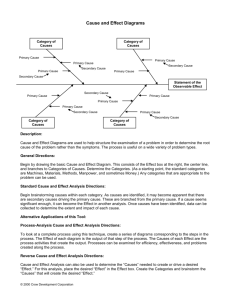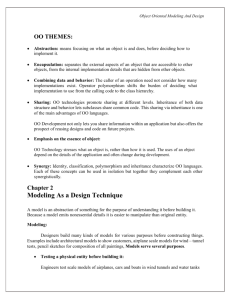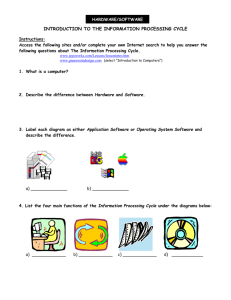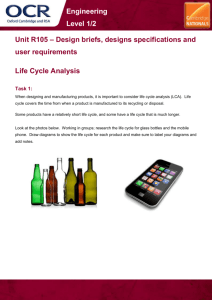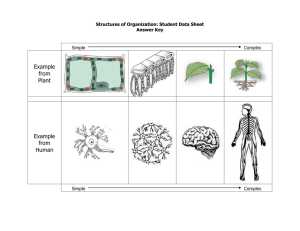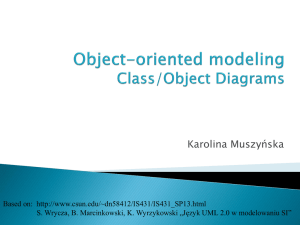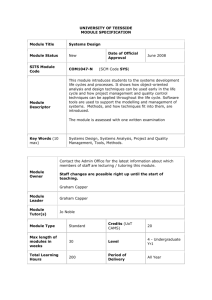UML Primer - GEOCITIES.ws
advertisement
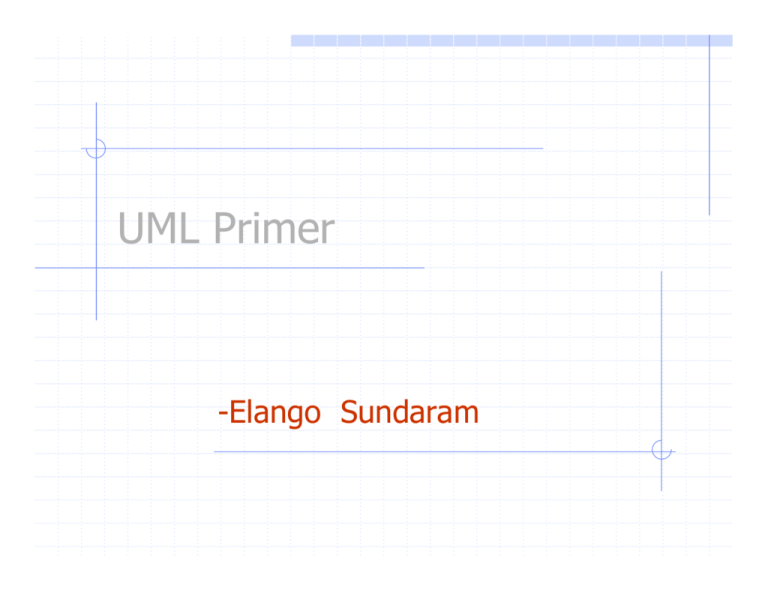
UML Primer
-Elango Sundaram
About UML
• UML Can be thought of as a blue print for
Software
• Graphical notation for expressing underlying
OOA&D ideas
• Can be used to design any type of application,
hardware, operating system and network
• UML is becoming an industry standard
• Helps better communication between Client/
Vendor, Designer/Developer,
Developer/Developer
• Can be used across domains
Brief History
1970’s Structured Programs
1980’s Abstract Data Types
1990’s Object Oriented Programs
Booch Method By
Grady Booch
Object Oriented
Software
Engineering
(OOSE) By Ivar
Jacobson
Rational
Corporation
“ OMG Consortium” with
Industry Leaders; Release
of UML 0.9 around 1996.
Object Modeling
Technique (OMT)
By James
Rumbaugh
UML diagrams
Types of UML Diagrams
Structural Diagrams
Class Diagram, Object Diagram, Component
Diagram, and Deployment Diagram.
Behavior Diagrams
Use Case Diagram, Sequence Diagram, Activity
Diagram, Collaboration Diagram, and State chart
Diagram.
Model Management Diagrams
Packages, Subsystems, and Models.
Some Key terms
Data Type
•
Domain of Allowed Values together with a set of allowed operations on it
•
Eg.. Integer (int)
Abstraction
•
Representation of an Entity with only attributes/methods of Interest
Key concept in computer science and one of the oldest
FORTRAN I had built in Abstract Data Type (ADT) by way of
floating points circa 1950s
Process Abstraction,Data Abstraction
A SQL procedure like calcValues() is an example of process
abstraction
Encapsulation
•
Grouping of subprograms and data they manipulate.
•
Eg. Classes in C++, Packages & Classes in Java
Some Key terms
Class
•
Grouping of Data with associated Methods
•
A class is a description of a set of objects that share the same attributes,
operations, methods,relationships, and semantics.
Object
•
Instance of class
Inheritance
Ability to extend exiting features of an entity and make some
modifications
Such inherited entities become sub-classes
Calling a method is called a message
Entire collection of methods of an entity is referred as message
interface or message protocol
Can be Single inheritance or multiple inheritance depending n the
number of direct parents a class extends from)
Java Permits only Single Inheritance whereas C++ provides for
multiple inheritance
Some Key terms
Information Hiding
•
Preventing access to variable/methods to outsides
•
Example in Java private, protected..
Overriding
•
A child deciding to change the way a parent functions; by changing the
implementation
Overloading
•
Method Overloading refers to the way a same method NAME can be
made to function in different ways.
Example
• add(int,int),
• add( array of numbers)
Interface
•
An interface is a named set of operations that characterize the behavior of
an element.
Method
•
A method is the implementation of an operation. It has the procedure/s
that affect the results of an operation.
Some Key terms
Polymorphism
Characteristics by which the class/Object exhibits dynamic behavior
Eg.
public class Child extends Parent{
public void invoke(){
System.out.println("CHILD");
}
}
public class Parent {
public void invoke(){
System.out.println("PARENT");
}
}
///
Parent p = (Parent) new Child();
p.invoke(); .. This will invoke the child..
///
Use Case Model
A use case represents a coherent unit of functionality provided by a
system
A use case diagram is a graph of actors, a set of use cases and the
relationships between these elements.
A use case is shown as an ellipse containing the name of the use case.
An extension point is a reference to one location within a use case at
which action sequences from other use cases may be inserted.
The use cases may be enclosed by a rectangle that represents the
boundary of the containing system.
Use Case Contd.
Relationships among use cases are as follows:
Association – The participation of an actor in a use case, i.e.
instances of the actor and instances of the use case
communicate with each other.
Include – An include relationship from use case A to use
case B indicates that an instance of the use case A will also
contain the behavior as specified by B.
Extend –An extend relationship from use case A to use case
B indicates that an instance of use case B may be
augmented (subject to specific conditions specified in the
extension) by the behavior specified by A.
Generalization – A generalization from use case A to use
case B indicates that A is a specialization of B.
Use Case Contd.
Use Case Contd.
Captures business scenarios of the application
Use Case : Name
Actors
Use Case : BookTravelTicket
Actors: TravelAgent, AgentManager
Pre Conditions
Pre Conditions: authentication
Descriptions
Descriptions
Post Conditions
Post : Display Tickets Booked
Special requirements
Special requirements:
•Check Availability of Ticket
•Payment
Class Diagrams
Classes Diagrams show
•
Classes
•
Interrelationships
•
Inheritance
•
Generalization
•
Associations
A Class
Name
Attributes
Methods
Normally based on
Functionality/
Representation eg. Vector
Content, type, values
Logic /
Implementations
Student
roleNumber
section
getRoleNumber
updateSection
Class Diagram Contd.
Association
An association declares a connection (link) between instances of the
associated classifiers (e.g.,classes).
Multiplicity
The multiplicity property of an association end specifies how many
instances of the classifier at a given end (the one bearing the multiplicity
value) may be associated with a single instance of the classifier at the
other end. A multiplicity is a range of nonnegative integers.
0..1
1
0..*
*
1..*
1..6
1..3,7..10,15,19..*
Class Diagram Contd.
Association & Multiplicity
The Company has 1 to many Employees.
Com pany
1..n
Em ployee
Dependency
A dependency indicates a semantic relationship
between two model elements. In the following example,
the sort() method depends on the BubbleSortImpl to do
the sorting.
BubbleSortImpl
Sort
sort()
Class Diagram Contd.
Generalization
A generalization is a relationship between a more
general element and a more specific element.
Car
MarutiZen
Aggregation
This defines Whole and part relationship between
two classes.
Class Diagram Contd.
Composite aggregation
Composite aggregation is a strong form of aggregation. This means
that the composite object is responsible for the creation and
destruction of the parts. If a composite object is destroyed, it must
destroy all of its parts.
Sequence Diagrams
A sequence diagram shows an interaction arranged in time
sequence. It does not show the associations among the
objects.
Sequence diagram has two dimensions:
the vertical dimension represents time and
The horizontal dimension represents different objects.
Sequence diagram shows:
Types of objects involved in a scenario
Messages exchanged
Return values
Sequence Diagrams Contd..
Collaboration Diagrams
•
A collaboration diagram shows the relationships among
the objects playing the different roles.
•
Collaboration diagram does not show time as a separate
dimension,
•
The sequence of interactions and the concurrent threads
must be determined using sequence numbers.
•
Collaboration and Sequence Diagram are called
Interaction Diagrams.
Collaboration Diagrams
THANK YOU FOR YOU TIME.
Happy Coding and Diagramming.

